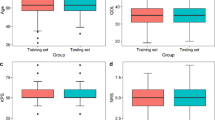Abstract
Lung cancer has the highest cancer mortality rate in the UK. Most patients are diagnosed at an advanced stage because common symptoms for lung cancer such as cough, pain, dyspnoea and anorexia are also present in other diseases. This partly attributes towards the low survival rate. Therefore, it is crucial to screen high risk patients for lung cancer at an early stage through computed tomography (CT) scans. As shown in a previous study, for patients who were screened for lung cancer and were identified with stage I lung cancer, the estimated survival rate was 88% compared to only 5% who have stage IV lung cancer. This paper aims to build tree-based machine learning models for predicting lung cancer risk by extracting significant factors associated with lung cancer. The Clinical Practice Research Datalink (CPRD) data was used in this study which are anonymised patient data collected from 945 general practices across the UK. Two tree-based models (decision trees and random forest) are developed and implemented. The performance of the two models is compared with a logistic regression model in terms of accuracy, Area Under the Receiver Operating Characteristic curve (AUROC), sensitivity and specificity, and both achieve better results. However, as for interpretability, it was found that, unlike coefficients in logistic regression, the default feature importance is non-negative in random forests and decision trees. This makes tree-based models less interpretable than logistic regression.
Supported by Nottingham Trent University Medical Technologies and Advanced Materials Strategic Research Theme. Teena Rai is funded by NTU VC PhD studentship.
Access this chapter
Tax calculation will be finalised at checkout
Purchases are for personal use only
Similar content being viewed by others
References
Briggs, E., de Kamps, M., Hamilton, W., Johnson, O., McInerney, C.D., Neal, R.D.: Machine learning for risk prediction of Oesophago-gastric cancer in primary care: comparison with existing risk-assessment tools. Cancers 14(20), 5023 (2022). https://doi.org/10.3390/cancers14205023
Cassidy, A., et al.: The LLP risk model: an individual risk prediction model for lung cancer. Br. J. Cancer 98(2), 270–276 (2008). https://doi.org/10.1038/sj.bjc.6604158
Doll, R., Peto, R., Boreham, J., Sutherland, I.: Mortality in relation to smoking: 50 years’ observations on male British doctors. BMJ 328(7455), 1519 (2004). https://doi.org/10.1136/bmj.38142.554479.AE
Durham, A.L., Adcock, I.M.: The Relationship between COPD and Lung Cancer. Lung Can. 90(2), 121–127 (2015). https://doi.org/10.1016/j.lungcan.2015.08.017
Gould, M.K., Huang, B.Z., Tammemagi, M.C., Kinar, Y., Shiff, R.: Machine learning for early lung cancer identification using routine clinical and laboratory data. Am. J. Respir. Crit. Care Med. 204(4), 445–453 (2021). https://doi.org/10.1164/rccm.202007-2791OC
Liu, X.-Y., Wu, J., Zhou, Z.-H.: Exploratory undersampling for class-imbalance learning. IEEE Trans. Syst. Man Cybern. Part B (Cybern.) 39(2), 539–550 (2009). https://doi.org/10.1109/TSMCB.2008.2007853
Raji, O.Y., et al.: Predictive accuracy of the liverpool lung project risk model for stratifying patients for computed tomography screening for lung cancer. Ann. Int. Med. 157(4), 242–250 (2012). https://doi.org/10.7326/0003-4819-157-4-201208210-00004
Sagi, O., Rokach, L.: Explainable decision forest: transforming a decision forest into an interpretable tree. Inf. Fusion 61, 124–138 (2020). https://doi.org/10.1016/j.inffus.2020.03.013
Shen, Y., et al.: A logistic regression approach to a joint classification and feature selection in lung cancer screening using CPRD data. In: 2022 2nd International Conference on Trends in Electronics and Health Informatics (2022)
Tammemägi, M.C., et al.: Selection criteria for lung-cancer screening. N. Engl. J. Med. 368(8), 728–736 (2013). https://doi.org/10.1056/NEJMoa1211776
Tammemägi, M.C., et al.: Development and validation of a multivariable lung cancer risk prediction model that includes low-dose computed tomography screening results: a secondary analysis of data from the national lung screening trial. JAMA Netw. Open 2(3), e190204 (2019)
Author information
Authors and Affiliations
Corresponding author
Editor information
Editors and Affiliations
Rights and permissions
Copyright information
© 2023 The Author(s), under exclusive license to Springer Nature Switzerland AG
About this paper
Cite this paper
Rai, T. et al. (2023). Decision Tree Approaches to Select High Risk Patients for Lung Cancer Screening Based on the UK Primary Care Data. In: Juarez, J.M., Marcos, M., Stiglic, G., Tucker, A. (eds) Artificial Intelligence in Medicine. AIME 2023. Lecture Notes in Computer Science(), vol 13897. Springer, Cham. https://doi.org/10.1007/978-3-031-34344-5_4
Download citation
DOI: https://doi.org/10.1007/978-3-031-34344-5_4
Published:
Publisher Name: Springer, Cham
Print ISBN: 978-3-031-34343-8
Online ISBN: 978-3-031-34344-5
eBook Packages: Computer ScienceComputer Science (R0)




